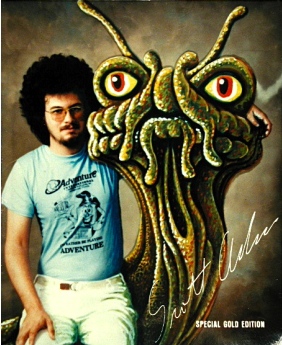

The current issue of GamesTM magazine (issue 88) has a profile piece I wrote about Scott Adams, the developer of the very first commercial adventure games. Since the magazine is only available in the UK, I haven’t seen it yet, which is driving me crazy.
Infocom and Sierra are usually credited as being the pioneers of the adventure genre, but Scott’s company, Adventure International, came first. He started out in 1978 with Adventureland for the TRS-80, having been inspired by Colossal Cave and Zork, which he played over a mainframe. (The commercial version of Zork didn’t come out until 1980, as did Sierra’s first game, Mystery House.) Adventure International was in business until the mid-1980s.
I first played Scott’s text adventures on a TI-99/4A in 1984 or so (which would put me at the ripe old age of six). We had to hook up a tape player to the computer and then wait twenty minutes while the game (loudly) loaded into memory. The games used two word commands (GET BOOK, etc.) and were primarily treasure hunts draped with loose stories, but over time Scott started making the games more complicated, with a few of his later games using day/night cycles and allowing you to switch between playable characters. They got harder as they went along, too. I remember solving one of them, Mission Impossible, on my own when I was maybe eight or nine. Some of the later games I still can’t finish now!
If you’re in the mood for a little nostalgia, you can find links to browser-based versions of most of Scott’s games on his website. There are also some fun “Let’s Play” threads over at SomethingAwful for Adventureland and Pirate Adventure, but the site won’t let me look at them anymore because they’re past a certain age and I don’t have an upgraded account. Oh well.
Anyway, if you’re in the UK and want to see how the adventure genre got started, you should check out the article. In addition to a number of fun facts from Scott himself, it also includes nice retro artwork from the archives at Ye Olde Infocomme Shoppe and the Museum of Computer
Adventure Game History. (At least, I think it does…)
 Emily is a freelance writer, miniaturist, and adventure game enthusiast.
Emily is a freelance writer, miniaturist, and adventure game enthusiast.


Leave a Reply